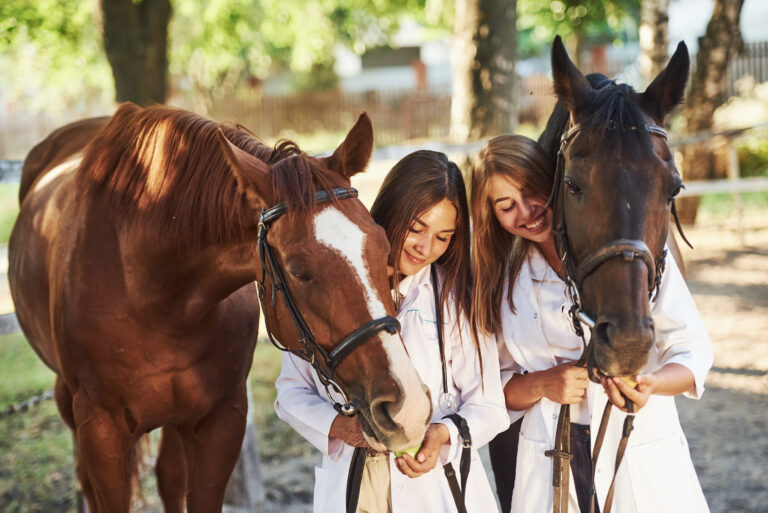
An equine athlete relies on ample nutritional components to fuel performance. These competitors also are often under strict management procedures, such as being stalled for long periods and undergoing the stress of travel and competition. Paying attention to the details of intestinal and muscle health can make all the difference between a stellar and subpar performance. A webinar (hosted by Standlee) presented by Stephen Duren, PhD, of Performance Horse Nutrition brought up several potential performance-limiting maladies in horses, including gastric ulcer syndrome, exertional rhabdomyolysis, polysaccharide storage myopathy and leaky gut syndrome.
Gastric Ulcer Syndrome (GUS)
The first consideration that Duren mentioned was gastric ulcer syndrome (GUS). Duren emphasized the need for horses’ intestinal pH to remain above 4, which is often best accomplished with access to free-choice forage. The pH drops within an hour of fasting between meals, and by 6-8 hours of fasting, horses can develop lesions.
He recommended using 25% alfalfa in the diet as a calcium buffer in addition to free-choice grass hay and turn-out. He also recommended feeding forage 30-60 minutes prior to exercise to act as a buffer, which can be accomplished with just 1-2 pounds of alfalfa. Instead of feeding soluble concentrates, he suggested replacing them with super fiber feeds like beet pulp and soy hulls.
By increasing the fat content of the diet, horses ingest more calories with the added benefit of decreasing acid production as food stays in the stomach for a longer time. In addition, marine-derived calcium products have acid-binding properties.
Useful nutritional supplements to help deter equine GUS include calcium or aluminum-based antacids, mucosal protectants like pectin and sucralfate, and products that improve healing, such as L-glutamine, glycine, DHA and whey protein. Anytime electrolyte supplements are given, Duren recommends flushing the mouth with water.
Muscle Issues
Exertional rhabdomyolysis (ER or tying up) is a muscle malady that can seriously impair performance. In many cases, a horse might develop ER from fluid and electrolyte losses in the sweat during exertion. However, there are three other forms of chronic ER: recurrent ER (RER), PSSM-1 and PSSM-2.
RER
RER is caused by an abnormality in intracellular calcium regulation, particularly in Thoroughbreds and Standardbreds. Typically, an affected horse is young, female, nervous and fit with limited turnout and irregular exercise. Strategies to mitigate this rely on diets that focus on calming rather than reducing sugars and starch. The grain portion of the diet can be titrated in the three days prior to a race. Duren recommended feeding high-quality forage, super fibers, 10-13% fat, and grain that does not exceed 12-18% NSC. The horse should be stalled in a quiet area and trained first rather than last in the day. It might be necessary to tranquilize the horse for workouts and to retrain some of the nervous behavior. It is also important to provide turnout.
Polysaccharide Storage Myopathy (PSSM)
PSSM-1
This muscle disease, prevalent in Quarter Horses and warmbloods, is associated with a genetic mutation that causes overactivity of the glycogen synthase enzyme. This results in a 1-8-fold increase in stored muscle glycogen. Horses with PSSM-1 need regular turnout and careful monitoring of sugar intake of pasture grass and feed. Supplementing a high-fat diet is helpful although not entirely necessary; some affected horses are often overweight. Forage sugars should be <12% NSC and fed to 1-1.5% of body weight. A grazing puzzle is helpful to limit pasture intake. A ration balancer is important for hay-only diets. If concentrates are fed, they should be low in NSC and fat.
PSSM-2
Another form of PSSM is PSSM-2, which is not caused by a genetic mutation, although the horse still has abnormal glycogen storage issues. Duren noted that this condition is prevalent in Quarter Horses, warmbloods, barrel racers, cutting horses and reining horses. Affected horses are often exercise-intolerant and unwilling to move forward. Horses with PSSM-2 aren’t as sensitive to sugars and starches, so they can be fed more like an RER horse (high-quality 12-14% protein, forage that is 10-17% NSC and 1.5% of body weight, and grain that is 15-20% NSC). These horses need consistent exercise at least three days a week with a maximum of two consecutive days of rest at any time. Duren recommended supplements like whey protein concentrate, cysteine and coenzyme Q10 to help with muscle contractile mechanisms.
Leaky Gut Syndrome
Another performance-limiting syndrome in the athletic horse is leaky gut syndrome. Nutritional management is key for equine leaky gut syndrome. Duren advised:
- Decrease soluble carbohydrates to limit pH changes.
- Increase fiber with hay, beet pulp and soy hulls.
- Strengthen the microbiome with pre-, post- and pro-biotics.
- Decrease inflammation with fish oil or algae that contain omega-3s like DHA/EPA.
- Provide supplements like zinc and butyric acid to repair the gut lining. Zinc helps with protein synthesis of tight junctions, and butyric acid is a short-chain fatty acid that is an energy source for epithelial cells. However, at this time, butyric acid preparations are highly unpalatable.
- Decrease equine stress whenever and however possible.








